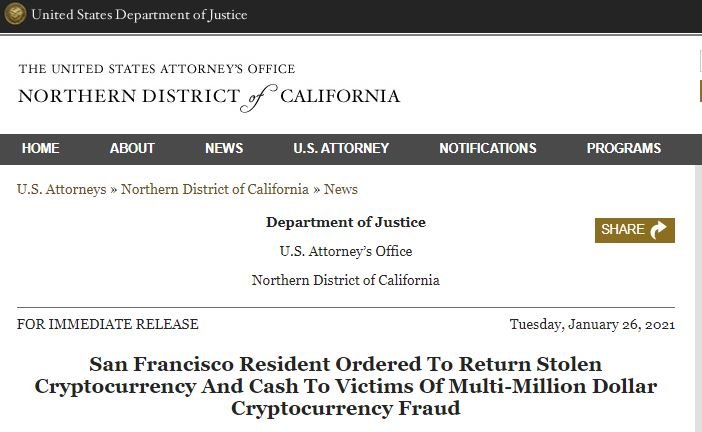A report from the U.S. Department of Justice (DOJ) reveals that Jerry Ji Guo has been convicted of his participation in a cryptocurrency fraud scheme. According to Craig D. Fair, Special Agent of the Federal Bureau of Investigation (FBI), the defendant must pay more than $4.3 million USD in compensation to affected users, in addition to serving a six-month prison sentence. Once his sentence has been served, Jerry Ji Gou must serve a three-year term in supervised release.
The 33-year-old defendant, living in San Francisco, California, pleaded guilty in mid-2019 to eight charges of electronic fraud, acknowledging that he represented himself as an initial cryptocurrency offering consultant and assuring his victims that he would conduct major marketing campaigns. However, Guo used the victims’ money for his own purposes and without making any investment in cryptocurrency.

Federal agents believe that cryptocurrency can pose a serious threat, as its use allows cybercriminal groups to hide their records, although these operations can be tracked using the right methods: “We collaborate with our partners in the private sector to locate the stolen assets from victims,” Special Agent Fair adds.
The DOJ mentions that, as part of its plea agreement, the defendant will work with government agencies to identify and return stolen property through forfeiture. In addition, the authorities obtained court orders to seize stolen cash and virtual assets and eventually restore them to their rightful owners in February 2020.
Court documents mention that the defendant would have defrauded cash and cryptocurrency for about $20 million USD today. The Money Laundering and Asset Recovery Section, a component of the Justice Department’s Criminal Division in Washington, D.C., will use the victim restoration process in the damage repair process.
Although this field escapes the financial regulation of the U.S. government, cryptocurrency-related fraud is investigated and prosecuted like any other variant of electronic fraud: “Many mistakenly believe that the law is completely removed from the world of cryptocurrencies; this case proves otherwise by filing criminal charges that allow the return of stolen money to victims,” Special Agent Fair concludes.
For more information on cybercrime, malicious hacking, vulnerabilities, exploits, malware variants, cybersecurity risks and information security courses, feel free to access the International Cyber Security Institute (IICS) website.

He is a well-known expert in mobile security and malware analysis. He studied Computer Science at NYU and started working as a cyber security analyst in 2003. He is actively working as an anti-malware expert. He also worked for security companies like Kaspersky Lab. His everyday job includes researching about new malware and cyber security incidents. Also he has deep level of knowledge in mobile security and mobile vulnerabilities.











